Why Did Greece Expel Libyan Ambassador? – OpEd
Greece has called for the expulsion of the Libyan ambassador in an escalation of a dispute over a controversial deal signed between Libya’s UN-supported government and Turkey on maritime boundaries in the Mediterranean.
According to the Nikos Dendias, Greek foreign minister “in the morning we called the ambassador, Mohamed Younis AB Menfi, to be informed of the decision, we given him 72 hours to leave the country.” Turkey’s foreign minister condemned the move as outrageous.
On Thursday, the direct talks between the Turkish President, Recep Tayyip Erdoğan, and the Greek Prime Minister, Kyriakos Mitsotakis, on the margins of the NATO summit, failed to resolve the row over the sudden Turkish-Libyan claim to an exclusive economic zone.
Under the terms of a deal reached between Libya and Turkey on November 27, Turkey gets access to a zone across the Mediterranean, ignoring the objections of Greece, Cyprus and Egypt.
On the other hand, Mitsotakis said, the claim had no legal basis and insisted it would collapse.
The Greek parliament statement noted,“They are oblivious to history and geography as they do not take Greek islands into account,” adding that Ankara’s move had pushed the NATO country into “unprecedented diplomatic isolation”.
The Libyan foreign minister said Greece’s diplomatic move was unacceptable.
The row is part of a long-running dispute between Turkey and Greece over drilling rights in the Mediterranean, as well as a byproduct of the need of the Libyan UN-recognised government in Tripoli to remain close to Turkey as one of the few outside actors backing its effort to hold on to the capital.
There are a host of issues between Greece and Turkey over a ranging from mineral rights in the Aegean Sea to the future of a reunified Cyprus. Also, the tensions are running high because of Turkish drilling off Cyprus, and the EU has prepared sanctions against Turkey in response.
Moreover, Cyprus will take Turkey to the international court of justice in the Hague, and has enlisted the support of the EU. But Greece has said it will not tolerate any drilling south-east of Crete and has warned it will send its naval forces to prevent such a move if necessary. These issues result in bad relations between countries.
Turkey claims the UN convention on the law of the sea allows a country to stretch its territorial waters by 12 nautical miles out to sea, this give a rights to fishing, mining and drilling, the area can extend for an additional 200 miles. Further, if the maritime distance between the two countries is less than 424 miles, a bilateral deal, such as the one it has struck with Libya, is needed to determine a mutually agreed-upon dividing line for their respective exclusive economic zones. The controversy comes from here in the interest of these escalating political developments.
The deal between Turkish and Libyan is largely designed as a legal defense against Cypriot and Greek claims to the waters.
Nowadays Libya is diplomatically dependent on Turkey, but on the other hand the Tripoli government is taking a risk if it alienates key partners in the EU.
According to that deal Turkey supported Tripoli government with arms, as the United Arab Emirates and Egypt have been providing direct military support to the warlord Field Marshal Khalifa Haftar, who is mounting an increasingly effective effort to dislodge the GNA.

